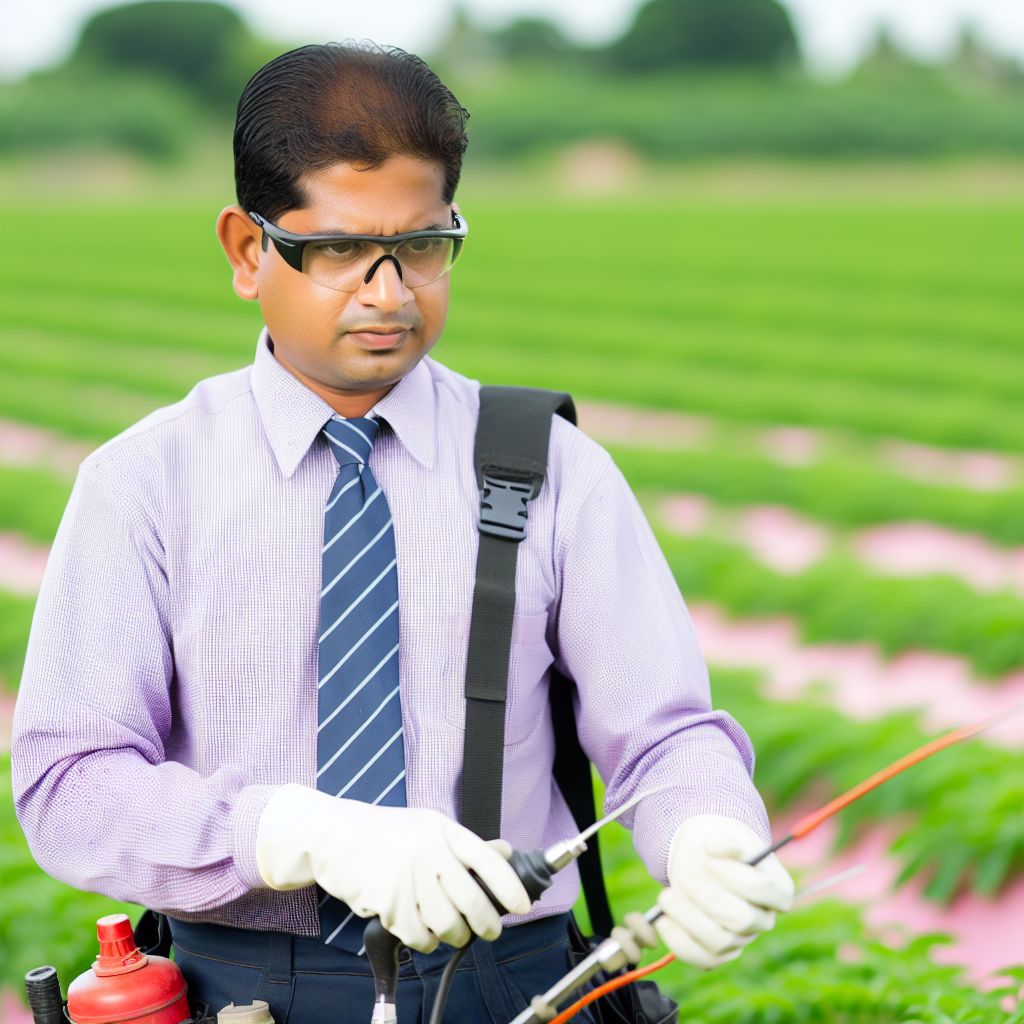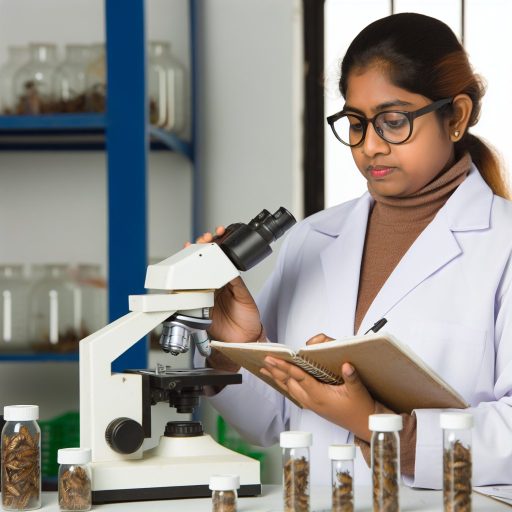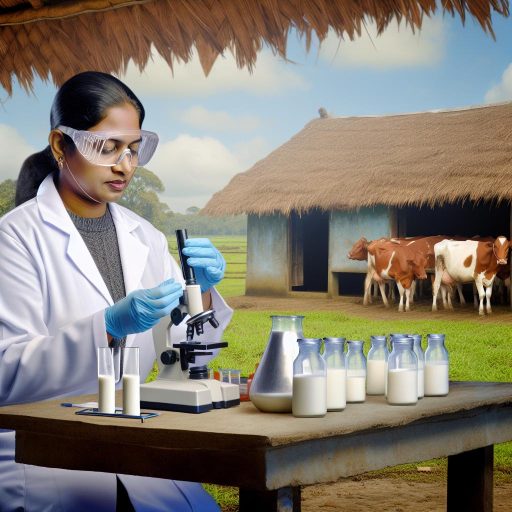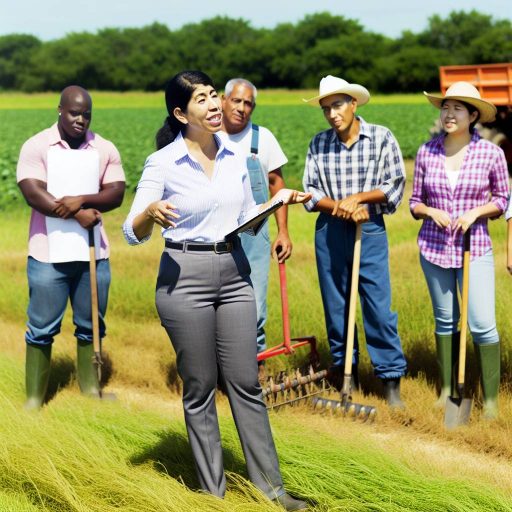Introduction
Pest control is crucial for crop protection in agriculture.
Pest control advisors play a vital role in safeguarding crops.
These advisors offer expertise in managing pests effectively.
By recommending the right strategies, they prevent crop damage.
Their knowledge helps farmers make informed pest management decisions.
Pest control advisors are essential for sustainable agriculture practices.
They help reduce the need for harmful chemical pesticides.
Their guidance ensures a balance between pest control and environmental protection.
Pest control advisors contribute to crop yield optimization.
Their work is instrumental in ensuring food security and economic stability.
Understanding the Role of Pest Control Advisors
Definition of pest control advisors: Pest control advisors, also known as PCAs, are trained professionals who specialize in providing advice and recommendations to farmers and agricultural producers on how to manage pests effectively.
Their qualifications and expertise in pest management: PCAs typically have advanced degrees in agricultural sciences, entomology, or related fields, along with specialized training in pest identification, biology, and control methods. They are required to stay up-to-date on the latest research and regulations.
Roles and Responsibilities of Pest Control Advisors:
- Conducting thorough inspections of crops to identify pest pressures and risks.
- Monitoring pest populations and assessing potential damage to crops.
- Developing integrated pest management (IPM) plans to control pests effectively.
- Providing recommendations on pest control strategies, including biological, cultural, and chemical methods.
- Advising on the proper timing and application of pest control treatments.
- Educating farmers on sustainable pest management practices and environmental protection.
- Collaborating with farmers, researchers, and other agricultural professionals to address pest challenges.
- Adhering to regulations and safety protocols to minimize risks to human health and the environment.
Benefits of Working with Pest Control Advisors:
- Precision in pest identification and management, leading to more effective control measures.
- Reduction in pesticide use and associated costs, promoting sustainable agriculture practices.
- Minimization of crop losses and overall improvement in crop yields and quality.
- Compliance with regulations and guidelines, ensuring safe and responsible pest control practices.
- Access to the latest research, technologies, and innovations in pest management.
- Support in developing long-term strategies for preventing pest outbreaks and building resilient crops.
- Enhanced knowledge and skills for farmers to independently manage pests in the future.
- Building partnerships and networks within the agricultural community to share best practices and solutions.
Identifying Common Crop Pests
Overview of common pests that threaten crops.
Crop pests can pose a significant threat to agricultural production worldwide. These pests come in various forms, from insects to fungi. They can cause extensive damage if not properly managed. Pest control advisors play a crucial role in helping farmers identify and combat these threats to ensure successful crop yields.
- Insects
- Weeds
- Fungi
- Nematodes
Description of the damage caused by these pests.
- Insects: Insects such as aphids, caterpillars, and beetles can feed on crops, causing holes in leaves, stunted growth, and reduced yields.
- Weeds: Weeds compete with crops for nutrients, water, and sunlight, leading to decreased crop growth and yield.
- Fungi: Fungi can infect crops and cause diseases like powdery mildew, blight, and rust, leading to wilting, discoloration, and rot.
- Nematodes: Nematodes are microscopic roundworms that feed on plant roots, causing stunted growth, wilting, and reduced nutrient uptake.
Uncover the Details: The Future of Poultry Science and Technology
Monitoring and Scouting for Pests
Pest control advisors conduct regular monitoring of crops to identify potential pest issues.
This involves visually inspecting the fields, checking traps, and using technology like drones.
By monitoring regularly, advisors can detect early signs of pest infestations and take preventive action.
Early detection is crucial as it allows for timely intervention to prevent widespread damage.
Transform Your Career Today
Unlock a personalized career strategy that drives real results. Get tailored advice and a roadmap designed just for you.
Start NowScouting helps in identifying the type of pests present and their population levels.
This information is essential for determining the most effective control measures to implement.
Explore Further: Sustainable Practices for Farm Managers
Implementing Integrated Pest Management Strategies
Integrated Pest Management (IPM) is a comprehensive approach that combines various strategies to effectively control pests while minimizing risks to human health and the environment.
Overview of Integrated Pest Management (IPM) Approach
IPM focuses on preventing pest problems before they occur. It involves monitoring pests to determine if and when control measures are needed. A combination of biological, cultural, physical, and chemical control methods is used.
- Biological control: This involves using natural enemies of pests, such as predators, parasites, and pathogens, to control pest populations.
- Cultural control: Changing farming practices, such as crop rotation or selecting pest-resistant crop varieties, helps reduce pest infestations.
- Physical control: Using physical barriers, traps, or other methods prevents pests from reaching crops.
- Chemical control: When necessary, using pesticides as a last resort occurs only when other methods have been ineffective.
Description of the Different Strategies Used by Pest Control Advisors in IPM
Pest control advisors play a critical role in implementing IPM strategies to protect crops from pest damage while minimizing environmental impact.
- Field scouting: Advisors regularly monitor fields to assess pest populations and determine if control measures are necessary.
- Identification: Advisors identify the specific pests present and their life cycles to develop targeted control strategies.
- Thresholds: Advisors establish action thresholds based on pest population levels to determine when control measures are needed.
- Preventive measures: Advisors implement cultural and biological control methods to prevent pest infestations before they become a problem.
- Monitoring: Advisors use traps, pheromone lures, and other monitoring tools to track pest populations and assess the effectiveness of control measures.
- Educational outreach: Advisors work closely with farmers to educate them on IPM practices and the importance of sustainable pest management.
- Record-keeping: Advisors keep detailed records of pest populations, control measures implemented, and outcomes to improve future pest management strategies.
Overall, pest control advisors play a crucial role in implementing IPM strategies to protect crops from pests while promoting sustainable agriculture practices.
Delve into the Subject: Understanding Collateral in Agricultural Loans

Utilizing Chemical Pesticides Responsibly
Farmers and pest control advisors understand the importance of using chemical pesticides as a last resort.
It is crucial to exhaust all available non-chemical methods before turning to these potent solutions.
While chemical pesticides can effectively eliminate pests, they can also have negative impacts on human health and the environment.
Discussion on the Use of Chemical Pesticides as a Last Resort
When pests become uncontrollable through natural means such as biological control or cultural practices, the use of chemical pesticides may be necessary to prevent significant crop damage.
However, this should only be considered after all other options have been explored and deemed ineffective.
One of the main reasons for the use of chemical pesticides as a last resort is the potential harm they can cause.
These potent chemicals can not only kill harmful pests but also beneficial insects that play a crucial role in the ecosystem.
Therefore, it is essential to use them judiciously and only when absolutely necessary.
Importance of Following Safety Guidelines and Regulations When Using Pesticides
To ensure the safe and effective application of chemical pesticides, farmers and pest control advisors must adhere to strict safety guidelines and regulations set by regulatory bodies such as the Environmental Protection Agency (EPA).
- Wearing appropriate protective gear such as gloves, masks, and goggles is essential when handling chemical pesticides.
- Following recommended dosages and application methods to prevent overuse or misuse of pesticides.
- Properly storing pesticides in secure containers away from children, pets, and food items to avoid accidental ingestion or contamination.
- Regularly maintaining and calibrating pesticide application equipment to ensure accurate and precise spraying.
- Disposing of unused pesticides and their containers responsibly according to local waste disposal regulations.
By following these safety guidelines and regulations, farmers and pest control advisors can minimize the risks associated with chemical pesticide use and protect both the environment and human health.
Moreover, using pesticides responsibly ensures that they remain effective in controlling pests while mitigating potential harm.
Learn More: Top Skills for Artificial Insemination Technicians
Transform Your Career Today
Unlock a personalized career strategy that drives real results. Get tailored advice and a roadmap designed just for you.
Start NowExplanation of how pest control advisors provide recommendations to farmers
Pest control advisors are experts in identifying and addressing pest issues that can harm crops.
They conduct thorough inspections of the fields to assess the extent of the problem and determine the specific type of pest that is causing damage.
Based on their findings, advisors develop a customized pest management plan that includes strategies for prevention, monitoring, and treatment.
They recommend the most effective and environmentally friendly methods to control the pest population and minimize damage to the crops.
Additionally, pest control advisors provide guidance on the proper use of pesticides and other control measures to ensure the safety of workers, consumers, and the environment.
They offer advice on timing and application techniques to maximize effectiveness and reduce the risk of resistance development in pests.
Importance of tailored solutions for specific pest problems
Every pest problem is unique, and a one-size-fits-all approach to pest control is not effective in the long term.
Pest control advisors understand the importance of developing tailored solutions that address the specific needs of each farm and crop.
By providing personalized recommendations, advisors can help farmers save time and money by avoiding unnecessary treatments and focusing on targeted solutions that deliver the best results.
Tailored pest management plans take into account factors such as crop type, pest species, weather conditions, and environmental considerations to ensure the most efficient control strategies are implemented.
Furthermore, tailored solutions help minimize the impact of pesticides on non-target organisms and reduce the risk of harmful residues in the food chain.
By using an integrated approach that combines biological, cultural, and chemical control methods, advisors can help farmers achieve sustainable pest management practices that support crop health and productivity.
Pest control advisors play a vital role in protecting crops by providing expert recommendations tailored to the specific needs of each farm and crop.
Their expertise and guidance help farmers effectively manage pest problems and minimize the risk of crop damage, ensuring a sustainable and productive agricultural system.
Importance of Pest Control Advisors for Crop Health
As we conclude, it is evident that pest control advisors play a crucial role in protecting crops.
They provide valuable insights, recommendations, and solutions to ensure the health and productivity of crops.
By working closely with farmers, pest control advisors help prevent and manage pest infestations.
Their expertise in identifying potential threats and implementing effective control measures is vital for crop success.
Farmers are encouraged to seek professional advice from pest control advisors for sustainable pest management.
By doing so, they can protect their crops, increase yields, and ultimately secure their livelihoods in the agricultural sector.
Transform Your Career Today
Unlock a personalized career strategy that drives real results. Get tailored advice and a roadmap designed just for you.
Start NowRemember, prevention is always better than cure when it comes to crop protection and pest management.
Let’s work together to safeguard our crops and ensure a bountiful harvest for generations to come!




